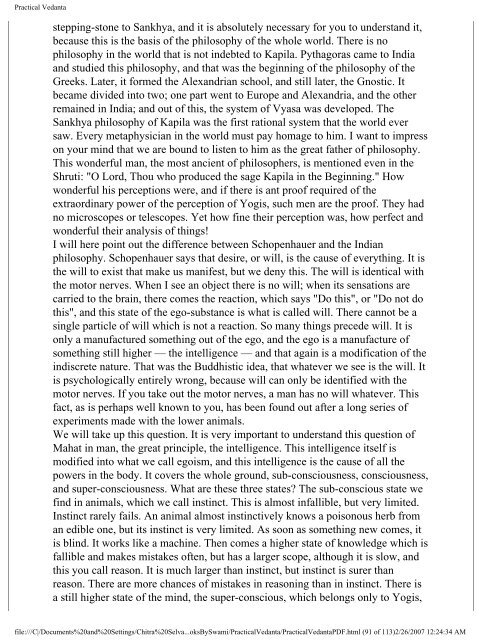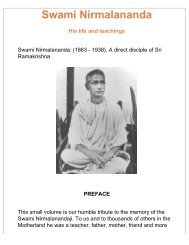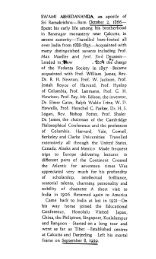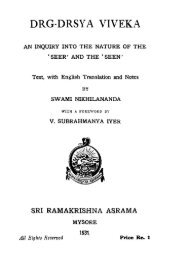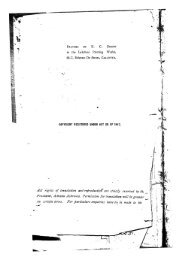<strong>Practical</strong> <strong>Vedanta</strong>part of this universe and came to certain conclusions, which we, analysing thephysical part, must come to, for they both must lead to the same centre.You must remember that the first manifestation of this Prakriti in the cosmos iswhat the Sankhya calls "Mahat". We may call it intelligence — the great principle,its literal meaning. The first change in Prakriti is this intelligence; I would nottranslate it by self-consciousness, because that would be wrong. Consciousness isonly a part of this intelligence. Mahat is universal. It covers all the grounds of subconsciousness,consciousness, and super-consciousness; so any one state ofconsciousness, as applied to this Mahat, would not be sufficient. In nature, forinstance, you note certain changes going on before your eyes which you see andunderstand, but there are other changes, so much finer, that no human perceptioncan catch them. The are from the same cause, the same Mahat is making thesechanges. Out of Mahat comes universal egoism. These are all substance. There isno difference between matter and mind, except in degree. The substance is thesame in finer or grosser form; one changes into the other, and this exactlycoincides with the conclusions of modern physiological research. By believing inthe teaching that the mind is not separate from the brain, you will be saved frommuch fighting and struggling. Egoism again changes into two varieties. In onevariety it changes into the organs. Organs are of two kinds, organs of sensationand organs of reaction. They are not the eyes or the ears, but back of those arewhat you call brain-centres, and nerve-centres, and so on. This egoism, this matteror substance, becomes changed, and out of this material are manufactured thesecentres. Of the same substance is manufactured the other variety, the Tanmatras,fine particles of matter, which strike our organs of perception and bring aboutsensations. You cannot perceive them but only know they are there. Out of theTanmatras is manufactured the gross matter — earth, water, and all the things thatwe see and feel. I want to impress this on your mind. It is very, hard to grasp it,because in Western countries the ideas are so queer about mind and matter. It ishard to get those impressions out of our brains. I myself had a tremendousdifficulty, being educated in Western philosophy in my boyhood. These are allcosmic things. Think of this universal extension of matter, unbroken, onesubstance, undifferentiated, which is the first state of everything, and which beginsto change in the same way as milk becomes curd. This first change is calledMahat. The substance Mahat changes into the grosser matter called egoism. Thethird change is manifested as universal sense-organs, and universal fine particles,and these last again combine and become this gross universe which with eyes,nose, and ears, we see, smell, and hear. This is the cosmic plan according to theSankhya, and what is in the cosmos must also be microcosmic. Take an individualman. He has first a part of undifferentiated nature in him, and that material naturein him becomes changed into this Mahat, a small particle of this universalintelligence, and this particle of universal intelligence in him becomes changedinto egoism, and then into the sense-organs and the fine particles of matter whichcombine and manufacture his body. I want this to be clear, because it is thefile:///C|/Documents%20and%20Settings/Chitra%20Selva...oksBySwami/<strong>Practical</strong><strong>Vedanta</strong>/<strong>Practical</strong><strong>Vedanta</strong>PDF.html (90 of 113)2/26/2007 12:24:34 AM
<strong>Practical</strong> <strong>Vedanta</strong>stepping-stone to Sankhya, and it is absolutely necessary for you to understand it,because this is the basis of the philosophy of the whole world. There is nophilosophy in the world that is not indebted to Kapila. Pythagoras came to Indiaand studied this philosophy, and that was the beginning of the philosophy of theGreeks. Later, it formed the Alexandrian school, and still later, the Gnostic. Itbecame divided into two; one part went to Europe and Alexandria, and the otherremained in India; and out of this, the system of Vyasa was developed. TheSankhya philosophy of Kapila was the first rational system that the world eversaw. Every metaphysician in the world must pay homage to him. I want to impresson your mind that we are bound to listen to him as the great father of philosophy.This wonderful man, the most ancient of philosophers, is mentioned even in theShruti: "O Lord, Thou who produced the sage Kapila in the Beginning." Howwonderful his perceptions were, and if there is ant proof required of theextraordinary power of the perception of Yogis, such men are the proof. They hadno microscopes or telescopes. Yet how fine their perception was, how perfect andwonderful their analysis of things!I will here point out the difference between Schopenhauer and the Indianphilosophy. Schopenhauer says that desire, or will, is the cause of everything. It isthe will to exist that make us manifest, but we deny this. The will is identical withthe motor nerves. When I see an object there is no will; when its sensations arecarried to the brain, there comes the reaction, which says "Do this", or "Do not dothis", and this state of the ego-substance is what is called will. There cannot be asingle particle of will which is not a reaction. So many things precede will. It isonly a manufactured something out of the ego, and the ego is a manufacture ofsomething still higher — the intelligence — and that again is a modification of theindiscrete nature. That was the Buddhistic idea, that whatever we see is the will. Itis psychologically entirely wrong, because will can only be identified with themotor nerves. If you take out the motor nerves, a man has no will whatever. Thisfact, as is perhaps well known to you, has been found out after a long series ofexperiments made with the lower animals.We will take up this question. It is very important to understand this question ofMahat in man, the great principle, the intelligence. This intelligence itself ismodified into what we call egoism, and this intelligence is the cause of all thepowers in the body. It covers the whole ground, sub-consciousness, consciousness,and super-consciousness. What are these three states? The sub-conscious state wefind in animals, which we call instinct. This is almost infallible, but very limited.Instinct rarely fails. An animal almost instinctively knows a poisonous herb froman edible one, but its instinct is very limited. As soon as something new comes, itis blind. It works like a machine. Then comes a higher state of knowledge which isfallible and makes mistakes often, but has a larger scope, although it is slow, andthis you call reason. It is much larger than instinct, but instinct is surer thanreason. There are more chances of mistakes in reasoning than in instinct. There isa still higher state of the mind, the super-conscious, which belongs only to Yogis,file:///C|/Documents%20and%20Settings/Chitra%20Selva...oksBySwami/<strong>Practical</strong><strong>Vedanta</strong>/<strong>Practical</strong><strong>Vedanta</strong>PDF.html (91 of 113)2/26/2007 12:24:34 AM
- Page 1 and 2:
Practical VedantaPractical VedantaP
- Page 3 and 4:
Practical Vedantaworld. If I am a s
- Page 5 and 6:
Practical Vedantadifference is only
- Page 7 and 8:
Practical VedantaThe ideal of faith
- Page 9 and 10:
Practical Vedantamoment of our live
- Page 11 and 12:
Practical Vedantaof the Christs and
- Page 13 and 14:
Practical Vedanta"This life is Brah
- Page 15 and 16:
Practical Vedantadark fifteen days,
- Page 17 and 18:
Practical Vedantalife. This is the
- Page 19 and 20:
Practical Vedantaeverything would b
- Page 21 and 22:
Practical Vedantait is only through
- Page 23 and 24:
Practical Vedantawhich is that subt
- Page 25 and 26:
Practical Vedantanoumenon and pheno
- Page 27 and 28:
Practical Vedantato which is the be
- Page 29 and 30:
Practical VedantaAbsolute.The finit
- Page 31 and 32:
Practical Vedantawhich is not the q
- Page 33 and 34:
Practical Vedantaexperience that th
- Page 35 and 36:
Practical Vedantafulfilled. The Jiv
- Page 37 and 38:
Practical Vedantabetween the pure r
- Page 39 and 40: Practical Vedantacome out straight.
- Page 41 and 42: Practical Vedantawar with one anoth
- Page 43 and 44: Practical Vedantanobody could under
- Page 45 and 46: Practical VedantaMy idea, therefore
- Page 47 and 48: Practical Vedantathe same methods.
- Page 49 and 50: Practical Vedantavarious minds, all
- Page 51 and 52: Practical Vedantabrotherhood; but t
- Page 53 and 54: Practical Vedantabrotherhood, but w
- Page 55 and 56: Practical Vedantawe all go with ves
- Page 57 and 58: Practical Vedantareason. What can y
- Page 59 and 60: Practical Vedantabeen preached in t
- Page 61 and 62: Practical Vedantathe husband kisses
- Page 63 and 64: Practical Vedantaof the knowledge a
- Page 65 and 66: Practical Vedantafor those who only
- Page 67 and 68: Practical Vedantasun exists because
- Page 69 and 70: Practical Vedantaof death was pleas
- Page 71 and 72: Practical VedantaGod. We must learn
- Page 73 and 74: Practical Vedantaa plague comes, it
- Page 75 and 76: Practical VedantaAtman? "As with a
- Page 77 and 78: Practical Vedantathat immortal One,
- Page 79 and 80: Practical Vedantaand the third egoi
- Page 81 and 82: Practical VedantaWitness of the uni
- Page 83 and 84: Practical VedantaPractical Vedanta1
- Page 85 and 86: Practical Vedantaeternal ; every ot
- Page 87 and 88: Practical Vedantafaculty, Buddhi, w
- Page 89: Practical VedantaPractical Vedanta1
- Page 93 and 94: Practical Vedantarecognition? Findi
- Page 95 and 96: Practical Vedantasentient." This is
- Page 97 and 98: Practical Vedantaessentially differ
- Page 99 and 100: Practical Vedantaexistence is limit
- Page 101 and 102: Practical Vedantalive, for I am lif
- Page 103 and 104: Practical Vedantasee from Kapila's
- Page 105 and 106: Practical Vedantalimitation, but th
- Page 107 and 108: Practical Vedantaperfect, infinite,
- Page 109 and 110: Practical Vedantaindividuality, of
- Page 111 and 112: Practical Vedantarepeat [something]
- Page 113: Practical Vedantaperson who dies in


